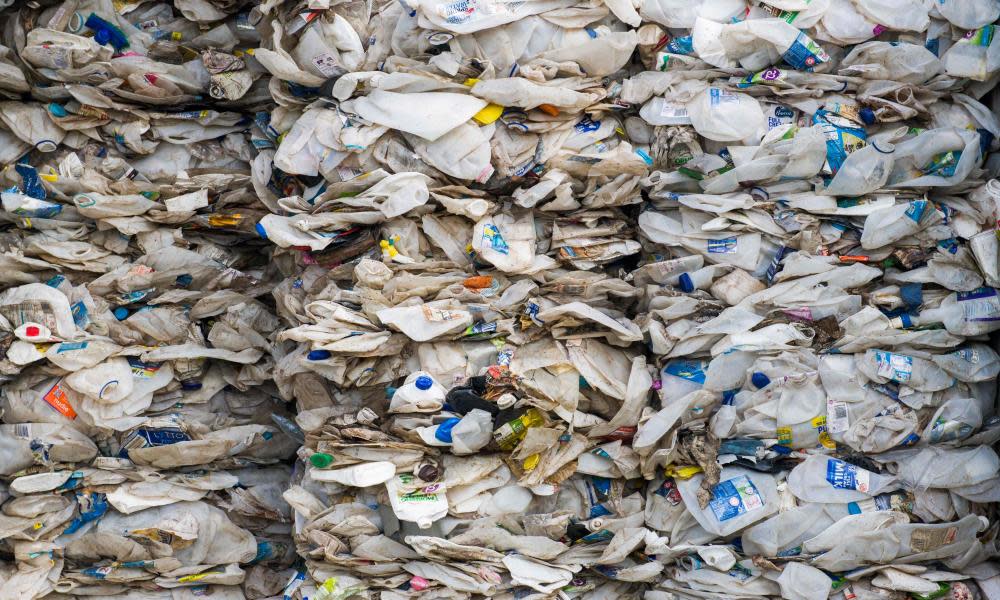Victorian recycling firm warns of landfill crisis if it goes under

A major recycling company feared to be at risk of going into administration has warned up to 400,000 tonnes of glass, paper, plastic and metals could be sent to landfill each year if it goes under.
Victoria-based SKM Recycling issued the warning in a submission to a parliamentary inquiry into the waste management crisis that has grown since China introduced an effective ban on most imported recyclable materials in 2017.
Councils in the state have called on all levels of governments to take steps to address the crisis and boost local recycling. The state’s leading green group, Environment Victoria, said the best-case scenario in the short-term may be SKM’s assets being sold to an established business committed to transforming the waste industry.
Related: Indonesia sends rubbish back to Australia and says it's too contaminated to recycle
SKM Recycling has faced fines and twice been banned from accepting recyclable material this year after the state Environment Protection Authority (EPA) found stockpiles of waste posed fire and health risks.
The acting EPA chief, Paul Stacchino, publicly admonished the company that “enough’s enough” last month after it failed to reduce piles of waste at a plant in Laverton North, in Melbourne’s west. A small fire at Laverton North last week followed a larger blaze at its Coolaroo plant, in the city’s north, in 2017 that forced 115 nearby homes to be evacuated.
The company did not respond to an interview request before publication, but in its submission to parliament it said Victorian government policies did not effectively deal with what would happen if a major recycler such as SKM ceased to operate. It suggested it could result in an extra 400,000 tonnes a year being directed landfill.
SKM said it had upgraded its operations to meet China’s tougher contamination standards for recyclable paper and cardboard, and had been the only Australian company to meet that standard. But it said that resulted in a reduced processing rate that increased stockpiles.
Related: Five Melbourne councils forced to dump recycling in landfill as Victoria crisis deepens
The company was heavily criticised by the government, councils and environmentalists.
Jonathan La Nauze, the chief executive of Environment Victoria, said SKM needed to “clean up their act or get out of the industry” for the sake of its workers and the public. He said if the company went into administration the best-case scenario was that “a reputable business buys them out and they’re brought up to standard”.
“The status quo is completely unacceptable,” he said.
La Nauze said fewer recycled goods were being used in Victoria than 15 years ago because it lacked a big enough market for recovered materials. He said the Andrews state government was taking positive steps to address the issue, including releasing a discussion paper on a circular economy signalling long-term reform, but warned there could not be another case where plants were banned from receiving recycled material without a plan in place.
“It would be inexcusable if there’s no contingency plan this time,” he said. “This is an essential service. It’s not acceptable to the public that recyclable materials end up in landfill.”
SKM is one of three major companies that processes recyclable goods in Victoria. Polytrade and Visy are the others. SKM says it receives kerbside-collected material from more than 30 councils, about 90% of which is sold into domestic and international markets for recycling.
The challenges facing the recycling industry were underlined last week when Indonesia said it would return eight containers of waste to Australia as it was contaminated. South-east Asian countries are increasingly warning they will not be a dumping ground for developed nations’ waste in the wake of China’s tougher rules.
Related: Australia urged to invest in recycling manufacturing after Indonesia sends rubbish back
But the Municipal Association of Victoria, representing the state’s councils, blamed most of the challenges facing the state’s recycling industry on SKM not meeting its obligations. “We need the state to work with industry to bolster sorting capacity at various facilities so that we don’t lurch from one crisis to the next,” the association’s president, Coral Ross, said.
A Victorian government spokeswoman said SKM’s failure to comply with state laws showed new players were needed in the industry. She said the state was transforming the way it thought about waste and spending $135m to help diversify the market and allow councils to renegotiate recycling contracts.
Trevor Evans, recently appointed as Australia’s first waste reduction minister, this week told Guardian Australia the Morrison government would set “ambitious” targets requiring all states and territories to spend a portion of procurement budgets on recycled materials, but declined to say what the target should be.
Related: Minister flags 'ambitious' recycling targets to kickstart waste market
The municipal association called on the Morrison government to introduce product stewardship rules that would require manufacturers to create products that generated little or no waste. It said the federal government could also ban or better regulate the production and importation of materials that are difficult to recycle and introduce standardised package labelling and a certification system for recycled content use.
It acknowledged the Victorian government was working on longer-term solutions and said councils were committed to helping develop a recycling market by purchasing recycled content.
Ross said the first goal should be avoiding generating waste. “Then we need to reduce, reuse and recycle, in that order, rather than just focus on recycling,” she said.

 Yahoo News
Yahoo News 
